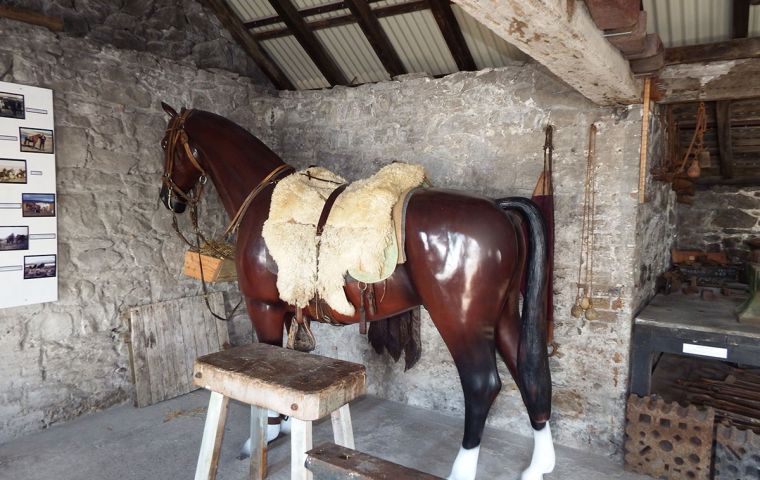MercoPress. South Atlantic News Agency
Falklands English with a Uruguayan flavor, “Chay”
 The Falklands gaucho legacy includes over two hundred Spanish place names (for example, recao, bozal, maneas, cojinillo, Bombilla Hill, Monte, Laguna Isla, Arroyo Malo)
The Falklands gaucho legacy includes over two hundred Spanish place names (for example, recao, bozal, maneas, cojinillo, Bombilla Hill, Monte, Laguna Isla, Arroyo Malo) By Yliana Rodríguez (*) – An English variety with an Uruguayan flavour Falkland Islands English has called my attention for more than a decade since my dear friend George Stewart once told me about the Spanish words used down there. I flew home to tell my Dad, who to my surprise remained unruffled at the news and went on to tell me about Uruguayan gauchos in the Falklands.
Little did I know then that the Falklands would become the epicenter of my PhD research. The following words are a miniature sketch of what I have found out since then. The history of the Falklands is hectic, from the many nations that set eyes on the archipelago -Dutch, French, Portuguese, British, Spanish, Argentine- to today’s state of affairs with people from over 60 nations living in the Islands.
Residents of the archipelago speak Falkland Islands English, which developed from the 19th century onwards as a result of migration mainly from the South-West of England and the northwest of Scotland.
Falklands English has moved away from the Scottish varieties, but still retains grammatical traces of them. In fact, it is generally confused with other southern varieties, given that it features characteristics common to the dialects of Australia and New Zealand.
However, even though contact within different English varieties has played a major role in its evolution, language contact has also contributed to its rise. More precisely, the contact with Spanish left its footprint in a legion of place names and loanwords which now represent part of the most characteristic Falkland Islands vocabulary. The most typical example of these Spanish loanwords (i.e., the words Falklands English has taken from Spanish) is the word used in the Islands to denote the rural area, which is known as “camp” (derived from Spanish campo).
The Falklands gaucho legacy includes over two hundred Spanish place names (for example, Chancho Point, Cerro Monte, Laguna Isla, Arroyo Malo), and many names applied to horse tack, as well as different types of horses, amongst other semantic fields. Here are a handful of examples: “freno” (bit), “recao ”(saddle), “bozal” (head collar), “maneas” (hobbles), “cojinillo” (sheepskin), “cincha” (girth), “sobrecincha” (small girth placed over the cojinilla); as well as the words “zaino” (very dark reddish black), “tostao” (roasted coffee), “alazan” (golden yellow), “blanco” (white), “colorado” (red), “mala cara” (crooked white blaze down the horse’s face), “picazo” (black or red horse with a white blaze or white spots down the face), “bayo” (yellowish), “gateado” (brownish), “negro” (black).
Those of you who are surprised by these data are probably wondering about the journey of these words. In a nutshell: the main socio-historical aspect that favored the contact between English and Spanish was the frequent transit of supplies and people to and from the South American mainland. Livestock farming was for a long time the economic engine of the Islands. The cattle business was primarily run by gauchos, who made their way mainly from Montevideo, since many worked for the Lafone brothers, who recruited Uruguayan and Chilean gauchos to their settlement on the islands: Hope Place, locally known by the Spanish name “Saladero”, with which it appears today on maps and road signs.
Falkland Islands local historian Joan Spruce explains that “from the few gauchos who came to the Islands to work, we have inherited a smattering of words connected with their daily lives and work or the animals and horse gear they worked with” (1992, p. 30). Nowadays, with the mechanization of industry and the reduction of field lots, horses are no longer needed for transportation (Islanders blissfully move around in Rovers), and cattle have been replaced by sheep.
This made the gauchos’ expertise unnecessary, and consequently, many borrowed words have fallen out of use. During my trips to the Falklands, I got to learn more and more about their idiosyncrasy, which kept making me think about the two countries’ bonds. In fact, during fieldwork, I found out something that did flabbergast my Dad: Islanders’ use of Uruguayan “pucha” and “che”. Though that remains for another column… later, chay!
(*) Ms Rodriguez is Dr. in Linguistics from the Uruguayan University of the Republic. She is linked to the Leiden University Centre for Linguistics (LUCL). During her BA and MA studies, she looked into the different ways in which languages borrow words from each other based on the idea that linguistic evidence, in the form of loanwords, can show the appearance of new ideas and things in the course of history of a society. For her doctoral research she focused on studying Spanish-English contact in the Falkland Islands (one of the few native English varieties of the Southern Hemisphere) with an innovative mixed methods approach.




Top Comments
Disclaimer & comment rules-

-

Read all commentsDid the world really need a PhD to tell us all this? Sorry, but this is all common knowledge and nothing new or surprising....and certainly not worth a PhD or the time of someone to study the bleedin' obvious.
Jun 30th, 2021 - 10:25 am +1These expressions have been used by Argentines and Uruguayans for more than 200 years, and they come from the gauchos who came to these islands from Argentina and Uruguay.
Jul 01st, 2021 - 07:38 pm 0Commenting for this story is now closed.
If you have a Facebook account, become a fan and comment on our Facebook Page!